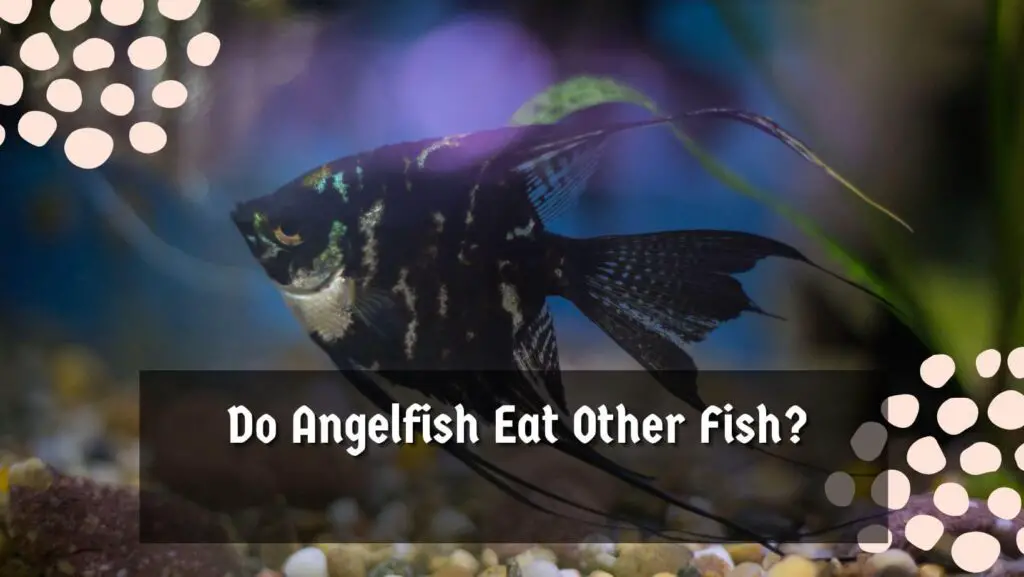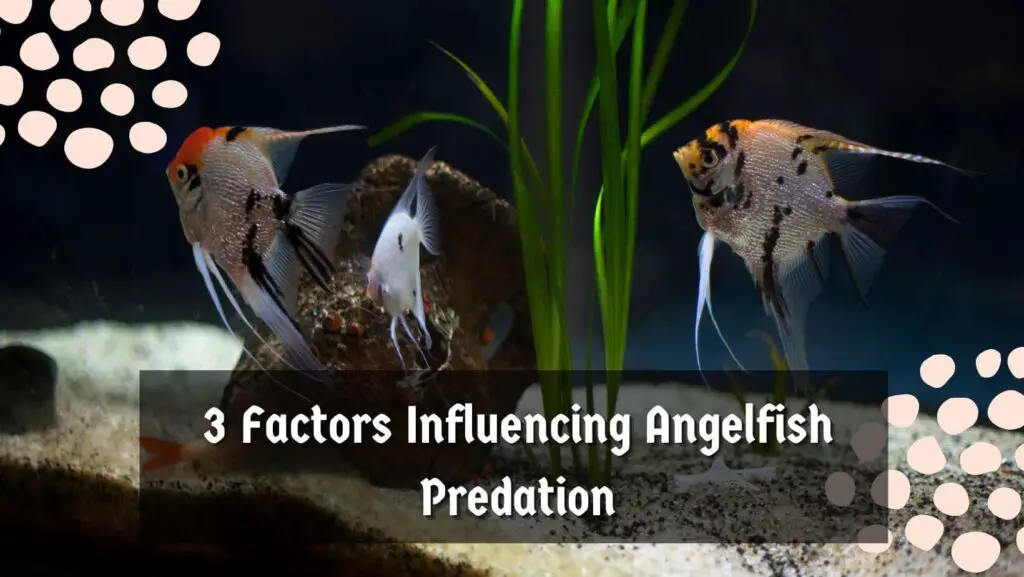
If you have a freshwater aquarium and want to add some beautiful aquarium fish known for their unique shape and vibrant print color, consider adding Angelfish. If you are considering so or already, one question that might come to your mind is, ‘Do angelfish eat other fish?’.
In this article, we will delve into the dietary habits of Angelfish and explore their compatibility with other fish species. But before all this, let’s find out the answer: Do Angelfish eat other fish?
Do Angelfish Eat Other Fish?

Angelfish don’t generally eat other fish because they are not strictly carnivorous. However, their diet primarily involves small invertebrates & plant matter. You might notice Angelfish exhibiting predatory behavior towards other fish if there is limited space or insufficient hiding places in the tank.
They may attack & prey on tankmates when certain circumstances are present. According to Ecology Center, Angelfishes are omnivorous and like eating flakes, small pellets, granules, and shrimp.
They primarily feed on small invertebrates and insects such as mosquito larvae and brine shrimp in their natural habitat. Besides that, Animal Diversity suggests that Queen angel fishes feed on sponges, corals & other small invertebrates. You should also note that Angelfish may consume algae. We’ve shared a recent article on ‘Do Angelfish eat Algae.’ Check it out.
After knowing that Angelfish are generally not known to be strict carnivores that prey on other fish, you need to know that there are instances where they may exhibit predatory behavior toward their tank mates.
Studies have shown that juvenile Angelfish are more likely to display aggressive behavior towards other fish than adult angelfish. As they mature, angel fish’s predatory tendencies usually decrease, but individual behavior can still vary.
Also, you should note that your angelfish aggression may get influenced by factors like tank size, environmental conditions, & feeding habits. If you keep your Angelfish in a tank with limited space or insufficient hiding places, they may exhibit territorial aggression and potentially prey on smaller or weaker fish. Keep your Angelfish in a large spacious tank decorated with many hiding places, rocks, and compatible life plants.
Compatibility of Angelfish with Other Fish
If you plan to keep your Angelfish with other face species in the same tank, consider their compatibility, which is essential to ensure a harmonious aquarium environment.
You must always choose fish species known for their peaceful nature, like tetras, guppies, & corydoras, which will help you promote a more peaceful coexistence within the tank.
When you are shopping for a tank mate that may peacefully coexist with your Angelfish, avoid fin-nipping species or aggressive ones like certain cichlids or barbs, which are known to be aggressive and often carry a tendency to nip at the fins of other fish.
It would help if you never paired Angelfish with this species to prevent accidents and conflicts. Consider checking both topic mentioned below to know about worst & best companions for angelfish.
3 Factors Influencing Angelfish Predation

In general, Angelfish are not very aggressive, and to know more about their aggression level, consider checking my recent article on ‘Are angelfish aggressive.’ In addition, Angelfish are known to live in small groups or pairs but are not particularly schooling fishes.
Check out this article to learn more about ‘are angelfish schooling fish.’ Coming back to the point, these freshwater angelfish (also check: why are angelfish freshwater?) are suitable to create a harmonious freshwater tank but can exhibit predatory Instincts in certain circumstances. Therefore, I recommend always considering the following aspects before adding any additional species or tankmate to the Angelfish aquarium.
Size of Angelfish
As I told you earlier, if your Angelfish is juvenile, it may feel vulnerable to its tankmate or be curious about its omnivorous diet, leading them to exhibit more Predatory-prey behavior than the adult ones.
As your fish will continue to grow, their dietary requirements will change, making them less likely to prey on other fishes. Also, you should note that female Angel fishes are more likely to exhibit aggressive behavior, so be mindful of the tank size.
Tank Size & Environment
As I told you earlier, any fish that feel cramped in the space provided may attack its tank made with aggression. Therefore, you must provide consistently ample space and appropriate hiding places to minimize territorial aggression, reducing the chances of Angelfish preying on other fish or their tankmate. Setting up a larger tank with plenty of hiding spots is best to create a more harmonious ecosystem.
Feeding & Nutrition
Now you also need to ensure that your Angelfish gets a well-balanced diet at the right interval daily. Feeding Angelfish multiple times a day is always recommended to meet their nutritional requirement and keep them active all day long. Proper feeding and adequate nutrition will further help you reduce the chances of Angelfish displaying any other predatory behavior related to hunger or due to a lack of essential nutrients.
3 Tips For Managing Angelfish Predation
If you think your Angelfish are displaying any signs of aggression toward its tankmate or other fish, below, I will mention a few strategies to help you manage that predation. Be mindful of the tips below to prevent potential harm and manage them properly for a harmonious & peaceful aquarium.
- The very first thing that you need to do is to separate the tank for incompatible fish. If you notice excessive aggression in particular species, separate them in a specific tank. This will ensure the well-being of both the Angelfish & other fish.
- Make sure you incorporate live plants, rocks, and decorations inside the angelfish aquarium, further creating hiding spots for smaller & more timid fishes. This will also help them escape potential aggression when required.
- It’s best to regularly observe your angel fish and look for signs of aggression. If you notice any sign of fin nipping or chasing, you must intervene promptly to prevent further harm to the other fish.
Conclusion
Even though Angelfish are not strictly carnivorous and like to pray on other fishes, there can be few instances of predatory behavior, particularly among Juvenile individuals. You must understand angelfish dietary requirements and habits to ensure proper feeding & nutrition.
Also, select the tankmates properly and create an appropriate environment to minimize Angelfish’s chances of praying on other fish. You should provide a well-balanced diet and monitor their behavior regularly to sustain a harmonious aquarium ecosystem and enjoy its beauty for longevity.
I have given my best to give you all the answers to the question: do Angelfish eat other fish? If you find the article helpful, then consider sharing it. Your share will help many people learn about ‘Do angelfish eat other fish’ and, if yes, what they should do about this aggressive predatory behavior. Do check my other helpful guides on angelfish facts. See you in the next post; till then, take care, and goodbye.

